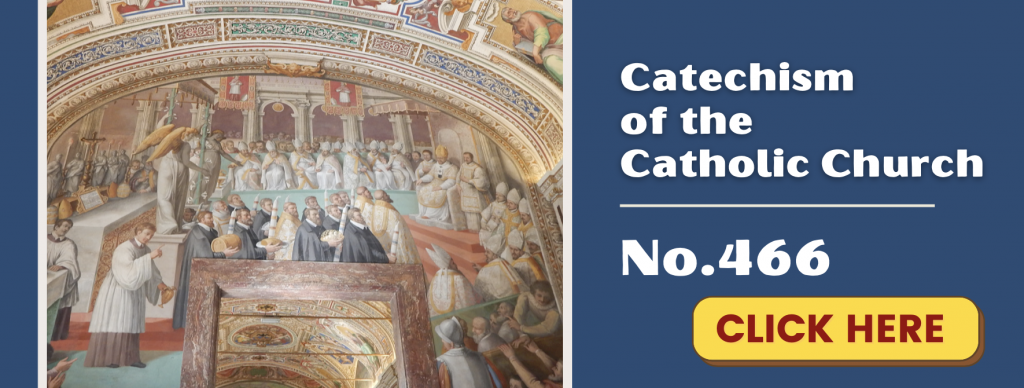Twenty-fourth Sunday in Ordinary Time



“For greater things you were born.” (Ven. Mother Luisita)
Sunday, September 12th Mk. 8: 27-35 The Feast of the Most Holy Name of Mary “Whoever wishes to come after me must deny himself, take up his cross, and follow me. For whoever wishes to save his life will lose it, but whoever loses his life for my sake and that of the Gospel will save it.”
Part One: Celebrate The Feast of the Most Holy Name of Mary with the Oblate Community, taken from Oblates of the Virgin Mary website, posted September 10, 2020
Part Two: What are the Evangelical Counsels? From the Catechism of the Catholic Church.
Part One:
Celebrate The Feast of the Most Holy Name of Mary with the Oblate Community.
The Feast of the Most Holy Name of Mary honors the Virgin Mary and marks the very mention of her name as holy and deserving of respect and devotion. Through this post, we’ll walk through the significance and history of her feast day before noting its importance to the Oblates of the Virgin Mary. For those of you who are familiar with the Oblates and our spirituality, it will come as no surprise that all Oblates are called to renew their vows on this special feast day.
What is The Feast of the Most Holy Name of Mary?
The Most Holy Name of Mary feast day honors Mary, the Mother of God, as blessed. It takes place each year on September 12th, four days after the feast of the Birth of the Blessed Mother. The feast day encourages us all to pray for her intercession to deepen our love of Christ and our relationship with the Lord.
According to the Catholic Encyclopedia, “We venerate the name of Mary because it belongs to her who is the Mother of God, the holiest of creatures, the Queen of heaven and earth, the Mother of Mercy. The object of the feast is the Holy Virgin bearing the name of Mirjam (Mary); the feast commemorates all the privileges given to Mary by God and all the graces we have received through her intercession and mediation.”
History of the Holy Name of Mary Feast Day
The Most Holy Name of Mary originated in Spain in the sixteenth century. In 1683, Pope Innocent XI extended the feast day to the universal Church and gave it the September 12th date. The date is significant because it marks a battle victory for Christian Europe against the Muslim Turks.
The Christians prayed for the intercession of Mary throughout their long and arduous campaign before achieving victory.
Celebrating the Most Holy Name of Mary
There is no better way to celebrate the Most Holy Name of Mary than by attending Mass, whether that be online or in person. To honor Mary on this feast day, you might also consider the following prayers and reflections:
- Pray and spend time reflecting upon the Hail Mary
- Pray one or more of these prayers for Mary’s intercession
- Pray and reflect upon the Rosary
- Use the Ven. Bruno Lanteri Prayer Booklet for your prayers
Importance to the Oblate Communities
The Oblates of the Virgin Mary have a special connection with Mary and pray often for her intercession. Venerable Bruno Lanteri, who founded the Oblates of the Virgin Mary, said “the Congregation of the Oblates is not my work, but the work of Mary Most Holy… She is its foundress, its mother, and its teacher.” The devotion of the Oblates is also expressed through our motto, “Think of Mary; call out to Mary.”
You can read more about the connection between the Oblates and the Virgin Mary in the book, Men of Mercy, Sons of Mary: The Lanterian Way by Dr. Cabrini Pak.
“I have known almost no other mother than Mary most holy, and throughout my life I have received nothing but caresses from such a good Mother.”
Venerable Bruno Lanteri
Renewal of Vows
Each year, the Oblates of the Virgin Mary celebrate the feast of the Most Holy Name of Mary by renewing their vows and dedication to Our Lord and Our Lady.
“In his life of consecration an Oblate should remember that, just as God continuously calls him to the intimacy of love, equally constant must be his generous and faithful response. He should therefore frequently examine his fidelity in collaborating with God who works within him. In this spirit it is convenient to renew the consecration even with the whole community in the celebration of the solemnity of the Most Holy Name of Mary, September 12. On the same day they also renew with the whole community their act of entrustment to Our Lady.”
Norm 12.1 of our Rule
Part Two: What are the Evangelical Counsels? From the Catechism of the Catholic Church.
Evangelical counsels, consecrated life…
CCC 915 … The perfection of charity, to which all the faithful are called, entails for those who freely follow the call to consecrated life the obligation of practicing chastity in celibacy for the sake of the Kingdom, poverty and obedience. It is the profession of these counsels, within a permanent state of life recognized by the Church that characterizes the life consecrated to God.454
CCC 916 … The state of consecrated life is thus one way of experiencing a “more intimate” consecration, rooted in Baptism and dedicated totally to God.455 In the consecrated life, Christ’s faithful, moved by the Holy Spirit, propose to follow Christ more nearly, to give themselves to God who is loved above all and, pursuing the perfection of charity in the service of the Kingdom, to signify and proclaim in the Church the glory of the world to come.456
One great tree, with many branches…
CCC 917 … “From the God-given seed of the counsels a wonderful and wide-spreading tree has grown up in the field of the Lord, branching out into various forms of the religious life lived in solitude or in community. Different religious families have come into existence in which spiritual resources are multiplied for the progress in holiness of their members and for the good of the entire Body of Christ.”457
CCC 918 … From the very beginning of the Church there were men and women who set out to follow Christ with greater liberty, and to imitate him more closely, by practicing the evangelical counsels. They led lives dedicated to God, each in his own way. Many of them, under the inspiration of the Holy Spirit, became hermits or founded religious families. These the Church, by virtue of her authority, gladly accepted and approved.458